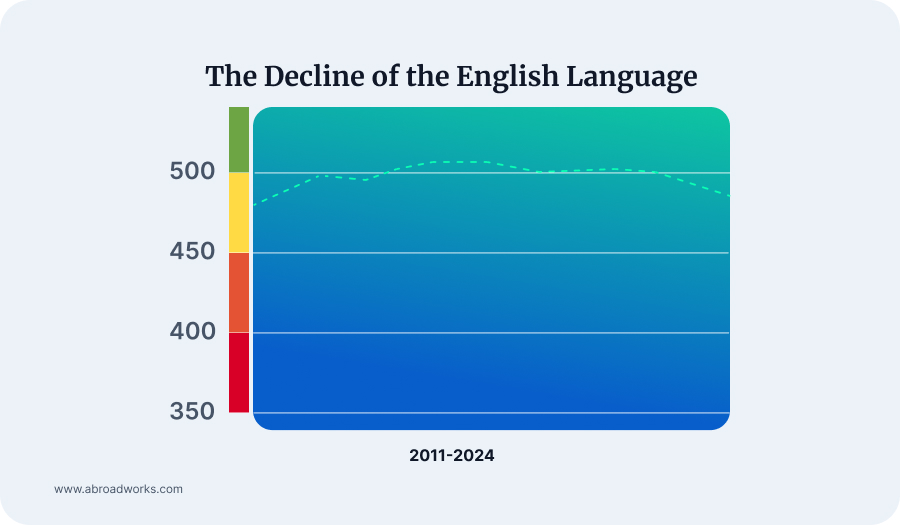Table of Contents
The Decline of the English Language
What Businesses Can Do to Adapt
Stick With Global English Language Hubs
Shift Language Priorities
Leverage New Tools and Technologies
Work With Reputable Employment Agencies
A Bright Future Without English
Contributors

David Landau
Contributor
Recent studies have shown that English proficiency is on the decline around the world. The EF Education First Foundation tests 2.1 million adults in 116 countries and regions every year to gauge the quality of English skills both regionally and globally, and the results of its most recent surveys are quite clear – English proficiency is in decline.
While some nations and regions improved their scores in 2024, on the whole, global English proficiency is in decline. Even nations that were once considered stalwarts of English competence are beginning to see a decline in skills.
While English is still the global lingua franca, its decline poses problems for many businesses, especially those using or looking to use offshore labor.
Businesses that wish to take their labor force offshore can take multiple steps to overcome the decline of the English language. These include –
- Sticking with global English language hubs
- Shifting language priorities
- Leveraging new tools and technologies
- Working with reputable employment agencies
The Decline of the English Language
English has, since its conception, become the dominant form of communication globally. Expanding far and wide beyond the Anglosphere (Australia, Canada, New Zealand, the UK, and the US), it has become the de facto language of business, trade, science, and technology. Today, there are over 1.5 billion speakers of the English language around the world, more than 18% of the world’s population, and while it is still the most spoken language, its popularity may be in decline.

The EF Education First English Proficiency Index has found a small but noticeable decline in global English proficiency since 2011, going from a score of 488 points in 2011 to 477 points in 2024. While this small decline might not seem like much in and of itself, this decline is in the wake of a period of almost chronic stagnation. Simply put, fewer people are learning English, and those who are have not been improving their skills. (1,2,3)

The decline we’re seeing in English skills looks even worse on the smaller scale. Those between the ages of 26 and 30, 31 and 40, and those over 40 have seen a stagnation in English proficiency in recent years. Globally, those aged 21 to 25 have seen their scores decline from 508 points in 2015 to 503 points in 2024. Even worse, those aged 18 to 20 have seen their EPI score decline from 537 points in 2015 to 453 points in 2024. A stunning decline of 84 points, a number that bodes poorly for future generations.





On a regional scale, we see even further stagnation and decline. Between 2011 and 2024, Asia’s EPI score only went from 470 points to 477, and Africa, Europe, and Latin America have all begun to plateau. Even stalwarts of the English language like India, the Philippines, Bangladesh, and South Africa have seen stagnation or even decline in their English proficiency scores in recent years.
The reasons for this decline in English proficiency are varied. The rise of new global superpowers has changed education priorities, and many would rather focus on other languages such as Mandarin and Hindi instead of just English. In addition, the growing popularity of the internet and social media means younger generations no longer need to be fluent in English to access the latest entertainment. (4)
The fact is, English is in decline, and new languages are starting to take its place. For the many businesses that rely on the English language to function, this poses a problem, and they will need to adapt.
What Businesses Can Do to Adapt
The decline of the English language poses problems for any business that relies on it, but it is especially problematic for businesses that choose to use offshore labor. As English declines, businesses will no longer have access to a ready supply of skilled workers around the world. Offshoring will become more difficult, and communication will become more challenging.
In spite of the obstacles, businesses can and should adapt, especially those who use offshore labor.
So, what can businesses do?
Stick With Global English Language Hubs
English might be down, but it certainly isn’t out.
English is still a primary language of dozens of countries around the world, many of which are ideal candidates for offshore labor.
Today, the Anglosphere (US, UK, Canada, New Zealand, Australia) no longer even holds the bulk of English language speakers globally. India is the second largest English-speaking country after the United States, with nearly 230 million citizens speaking the language. The UK, the originator of the English language, comes in at just 7th place, with Nigeria (3rd), Pakistan (4th), Indonesia (5th), and the Philippines (6th) surpassing it in number of English speakers.
Many nations still see the value of the English language, teaching English in both university and primary settings. Many individuals around the world are beginning to see the power of the English language, and have taken it upon themselves to learn it. With the rise of online education, it has become easier than ever for individuals to learn English, and it is still an incredibly marketable skill.
There are still a handful of rising stars in the English-speaking world. Romania, a popular destination for businesses looking for offshore tech support, ranks 12th globally on the EPI. South Africa, the tech hub of Africa, ranks 11th. Kenya ranks 19th and Malaysia ranks 26th on the EPI. All of these are prime destinations for offshore labor.
English is still the most widely spoken language on the planet, and while it may be in decline, it’s certainly here to stay. For businesses that need an offshore labor force fluent in English, by sticking with the language’s global hubs, businesses can still find plenty of skilled employees.
Shift Language Priorities
For some businesses, English proficiency may not have to be a priority, and if businesses choose to forgo perfect English skills, they can drastically expand their pool of available talent.
Functional or basic communication can be prioritized over high-level fluency. Certain employees don’t need to have perfect language skills but can still understand the basics of English, and be effective communicators and valuable employees. What often matters is less language skills and more high-level skills.
A skilled software developer or data scientist with a top-tier education and plenty of experience is an asset to any business, even if they can’t speak flawless English. As long as they can communicate effectively with their teammates and superiors, can understand proper procedures and documentation, and work to be an effective part of the team, they can be a productive worker.
Even without perfect English skills, a multilingual employee can still act as an effective translator when necessary. By leveraging their translation skills, a business can expand into new markets, hire employees with different skillsets, and find customers in unexpected places.
Even if English language skills are declining, there are still many people who understand enough to get the job done, are willing to work hard, and possess the necessary skills to make a difference in any business.
Leverage New Tools and Technologies
Employees who aren’t the most fluent in English can still be valuable members of the team, and modern technology can help overcome even the tallest of language barriers. Thanks to AI-powered translation tools, businesses can break down any language barrier and communicate across cultures.
Rapid advancement in AI-powered translation tools like Google Translate, DeepL, and ChatGPT is capable of translating any text in a matter of seconds. Employees can engage in in-depth and technically complex conversations using any language, without a high level of fluency in English. Complex documentation and brainstorming sessions can be done between anyone, anywhere, no matter the language.
AI translation can even be used to translate real-time conversation. Tools like Google Translate, DeepL, Microsoft Translate, Amazon Translate, and others can act as real-time translators for both online and in-person conversations. This allows for global teams of employees, who may not be able to communicate directly due to a language gap, to work together to achieve any goal.
Advancements in machine learning and neural networks mean that these AI translators are constantly adapting and improving, meaning they can pick up on even obscure slang and industry jargon.
Language barriers are already beginning to break down thanks to advances in AI, and soon they may even disappear. Businesses today can easily take advantage of these new tools and technologies to create international workforces.
The unifying force of the English language may eventually disappear, but technology is already taking its place.
Work With Reputable Employment Agencies
Sometimes a business needs an employee who is completely fluent in English, and there may be no way around it. If this is the case, multiple steps can be taken to ensure that a business looking to hire an offshore employee gets the right person with the right set of skills. A great step is to work with a reputable offshore employment agency.
Offshore employment agencies can vet potential employees through standardized tests and in-depth interviews. Many agencies have developed their own testing process through extensive analysis, and many others rely on preexisting, reputable testing systems made by third parties. English reading and writing skills are evaluated using both multiple choice tests and lengthy written responses to prompts. In-person interviews are often used to measure a candidate’s verbal skills, and these interviews can be recorded for later analysis and graded based on preexisting criteria.
Beyond testing, good employment agencies may have a better understanding of local education standards and practices in offshore destinations and be familiar with the best countries and regions for finding the most qualified candidates.
For those who need an employee with solid written and verbal English skills, a good employment agency can help sift through lists of candidates to find the best match to meet any business’s needs.
A Bright Future Without English
The English language may be experiencing a decline in popularity, and businesses will have to adapt, especially those planning to use offshore labor.
Fortunately, there are many ways to overcome the growing language barrier.
English is still the single most widely spoken language on the planet, and there are dozens of countries with a large labor force that is highly fluent in the language. Businesses can also shift their priorities. Sometimes perfect English skills aren’t always necessary, and “good enough” can be more than enough to get the job done.
Even if the language barrier continues to grow, AI and language translation software can knock it down and will only get better and better with time.
And if being fluent in English is a priority in an offshore employee, a company can work with a reputable employment agency to find the right employee for the job.
Citations:
- https://www.ef.edu/epi/
- https://www.ef.com/assetscdn/WIBIwq6RdJvcD9bc8RMd/cefcom-epi-site/reports/2024/ef-epi-2024-english.pdf?_gl=1*13t8hhl*_gcl_au*MTMwMTU4ODY2OS4xNzM5OTA0MDk4*FPAU*MTIwODM4MjUwNi4xNzM5OTA0MDk5*_ga*MTI0NDk1MTAzNi4xNzI4NTAxMDg5*_ga_25YNHDZQQP*MTczOTk5MzExNi40LjEuMTczOTk5ODgzNC4wLjAuNjMxNzkzMTAw&utm_source=(direct)&utm_medium=(none)
- https://www.ef.edu/about-us/press/articles/2024/worldwide-english-proficiency-index-reports-persistent-global-decline/
- https://www.teachingenglish.org.uk/sites/teacheng/files/pub_learning-elt-future.pdf
